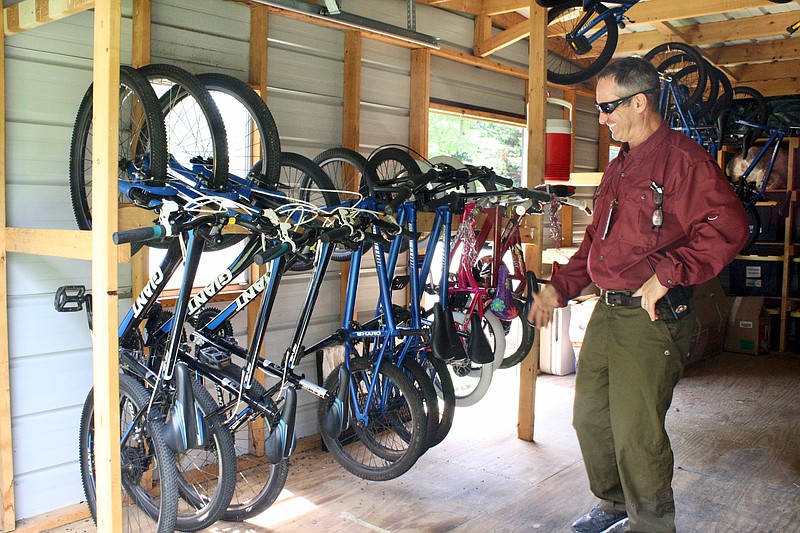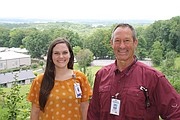Adventure education facilitator David Hoover hiked up the trail that leads to the overlook at Parkridge Valley's Child and Adolescent campus.
Most people get winded on the trek, but he said the view of Chattanooga is worth it, especially for the young clients with emotional and behavioral health problems who come to the campus for therapy.
"It helps put things into perspective," Hoover said as he pointed to buildings below, including a high school that appeared much smaller from the vantage point.
Mindy Brown, a certified recreation therapist at the campus, talks about perspective a lot during therapy, Hoover said, and looking down at Chattanooga helps patients relate to that concept, because "their world gets bigger."
Providers at the 80-acre Parkridge Valley Child and Adolescent campus - which serves the inpatient psychiatric needs of children under age 18 - use evidence-based recreation therapy to complement the more traditional mental health counseling sessions known as cognitive behavioral therapy.
Brown said recreation therapy takes the principles learned in cognitive behavioral therapy and gives patients an opportunity to experience them in real-life situations. When appropriate, they incorporate outdoor activities, such as hiking, disc golf, rock climbing, swimming and a ropes course.
"We learn through experience," Brown said. "It's hard to tell people how to feel better. It's easier to show them and explain why it worked."
The newest addition to campus is a bouldering wall inside the gym. Research from the University of Arizona in 2018 found the social, mental and physical endurance of bouldering - a form of rock climbing - could be successful psychotherapy for treating depression.
"There are different routes for your physical activity level, and there's a social aspect along with the feeling of an immediate accomplishment when bouldering," researcher Eva-Maria Stelzer said in a news release from the university. "You have to be mindful and focused on the moment. It does not leave much room to let your mind wonder on things that may be going on in your life - you have to focus on not falling."
Brown wants to dispel the misconception that her job is "just playing with the kids" and for more people to know about the benefits of recreation therapy.
"Everything is goal directed," she said. "When they come here, each of the kids have a variety of treatment issues that they're working on. I work with the treatment team as well as the child to establish their goals, and then we use the activity interventions in order to address those goals."
Recreation therapy can be used in children and adults to treat mental health conditions, such as depression, anxiety, post-traumatic stress disorder and eating disorders. However, anyone can benefit from therapy.
"We service all behavioral health needs, and we have a lot of kids who have come here with trauma," Brown said. "Sometimes, people are just going through a tough time and they need to learn those mood management pieces we're looking at the whole person - their mental health, their emotional health - and those things are very closely aligned."
The programs use sequencing to teach skills, such as regulating emotions, spending free time in healthy ways and problem solving in a safe environment. As patients begin to grasp new, more healthy behavior patterns, Brown said kids who are able to manage in recreation therapy groups are also appropriate for the adventure-based programming Hoover facilitates.
For example, people who think they can't ride a bike start with a desk cycle before moving to stationary bikes, which are arranged like spin class at a gym. At the campus bike shop, Hoover teaches clients to ride, care for and repair bicycles. Not only do the bikes help kids learn responsibility and self reliance, they can be an economical mode of transportation when patients return home.
"We have a microcosm here that represents the world outside," he said. "You're going back to where you came from, but you're going back with some new tools and new habits."
Every program and activity is strategically designed to emulate the community's expectations, down to the hand-drawn maps Hoover made to teach kids to navigate the hiking trails. The goal is to prepare patients when they are discharged to spend time in a healthy way without relapsing, Brown said.
"We have them practice so they gain that confidence and self efficacy so they can do it outside of here," she said. "Our overall goal is to launch these patients back into the community with a new skill set and without the stigma of mental health associated with that."
Contact Elizabeth Fite at efite@timesfreepress.com or 423-757-6673.

